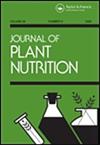补充氮和锌可提高玉米早期生长阶段的形态和生理特性
IF 1.6
4区 农林科学
Q3 PLANT SCIENCES
引用次数: 0
摘要
一些研究强调了锌对改善植物形态生理学的重要性。同时施用锌可以提高氮的吸收率,从而减少氮的损失,但氮的水平是否会影响锌的吸收?本文章由计算机程序翻译,如有差异,请以英文原文为准。
Nitrogen and zinc supplements can enhance morphology and physiology traits of maize at early growth stages
Several studies emphasized the importance of zinc for better morpho-physiology in plants. The co-application of Zn can reduce N loss by increasing its uptake rates, but whether N level can affect Z...
求助全文
通过发布文献求助,成功后即可免费获取论文全文。
去求助
来源期刊

Journal of Plant Nutrition
农林科学-植物科学
CiteScore
4.40
自引率
4.80%
发文量
238
审稿时长
24 months
期刊介绍:
Journal of Plant Nutrition serves as a comprehensive, convenient source of new and important findings exploring the influence of currently known essential and nonessential elements on plant physiology and growth. The journal emphasizes high value, intensive crop production in both horticulture and agronomic systems. Beneficial elements, symbiotic relationships between bacteria and fungi and crop yield, and the role of plant nutrients in disease control are some of the topics covered in addition to essential plant nutrients. Refereed by an internationally renowned editorial board ensuring the high level of scholarship, Journal of Plant Nutrition provides insightful coverage of nutritional topics, such as:
-Hydroponic and greenhouse crop nutrient requirements and factors influencing plant nutrition
-Nutrition involving container production
-Media analysis of pine bark, peat, and artificial media
-Interpretation/correlation of soil and plant analysis
-Intensive production of agronomic and vegetable crops
-Production and nutritional requirements of fruit, ornamental, floriculture, tropical, and foliage plants
-Use of precision agriculture for nutritional requirements of crops
-Plant growth promoting bacteria and elemental nutrition interactions as related to crop yield
Journal of Plant Nutrition serves as a platform for researchers to present their findings to an international audience, which will help to develop research programs that will further our knowledge of plant nutrition. It is also an invaluable resource utilized by growers and consultants to develop operational fertility regimes that are based upon the current peer reviewed publications.
 求助内容:
求助内容: 应助结果提醒方式:
应助结果提醒方式:


